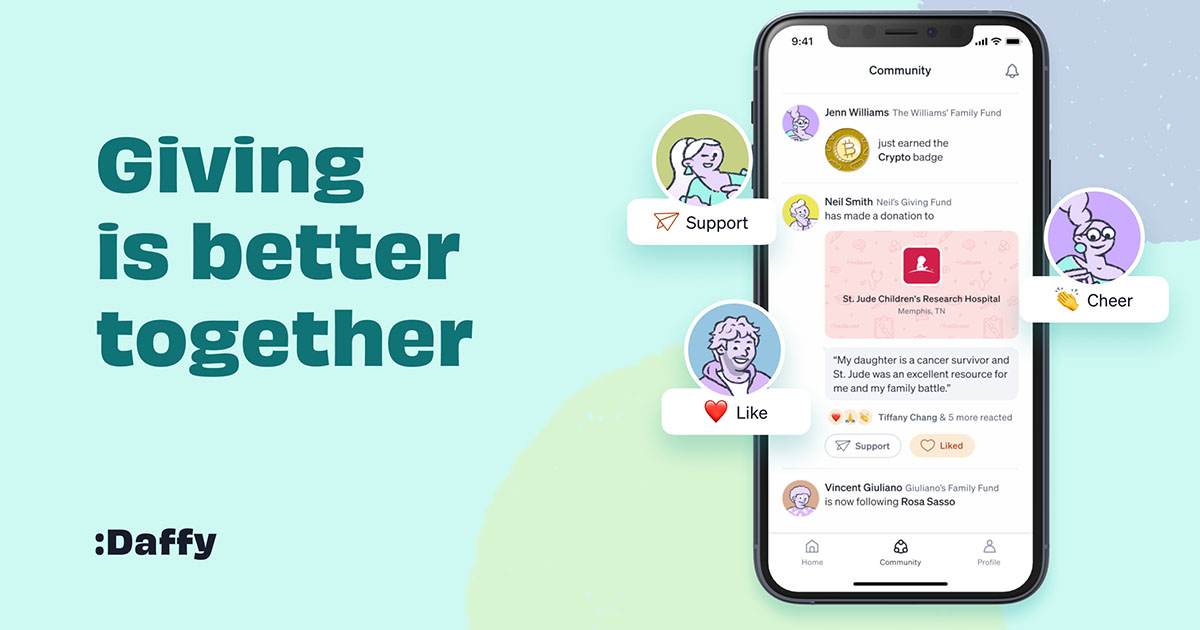Daffy: The Fintech Startup Making It Easier to Give
The Origin Story of Daffy

Last Updated: By TRUiC Team
Lots of people want to give generously to charity on a regular basis. However, life often gets in the way, and it’s easy to forget about your charitable giving goals until the year has flown by. But what if you could automatically invest your donations in tax-free accounts and easily give to the charities of your choice? That’s the vision of Adam Nash, founder and CEO of Daffy. This is Daffy’s origin story.
From Engineer to Entrepreneur
Like many people in Silicon Valley, Adam started out his career as an engineer. He worked for a number of venture capital firms and tech companies, including Apple, before starting Daffy. “I went out talking to dozens of people across the country about how they think about giving, and it turns out there is a real problem” in sticking to charitable giving goals, he says. “[W]hatever amount [people] thought that they should be giving to charity every year when you asked them how much they actually gave to charity, they missed their mark, and they weren't happy about it.”
As Adam notes, this is a common problem in other areas of personal finances, such as saving for retirement. One thing that almost universally helps is to automate the process of setting aside money for particular financial goals. “[T]his is actually… a lot of what great FinTech apps are built on … and it's what the research suggests,” he says. “And we found the same research for giving. We found that people who set a goal and automated it [gave] 32% more than people who don't.”
A platform that would help people give an average of 32% more to charity was “something worth fighting for,” he says. The problem was that existing charitable donation services were either poorly designed or catered primarily to the wealthy. “And so we thought that … was a ripe area to give it a shot and build something different.”
A Modern Platform for Giving
In a nutshell, Daffy is “a modern platform for giving, built around a financial account that's called a donor-advised fund,” Adam says. “The real idea behind Daffy was to make it exceptionally easy to be more generous more often… [T]oo many people don't put money aside for charity, which means that when they want to give, they're stuck with this very hard problem of how much they can afford to give, in addition to the hard problem of who do you give it to.”
To help people meet their giving goals, they enter those goals into Daffy’s app and agree to set aside a certain amount of money weekly or monthly. That money goes into a diversified portfolio of tax-free investments. “We have a large number of members who just use it as a better system for giving,” Adam says. “They have a standard set of charities they support every year…. They give a few hundred dollars every year to charity, and they just use Daffy to automate that, to put some money aside every month and make sure that they have recurring donations to the organizations they care about.”
Daffy also helps people give consistently, whether they’re having a good year or a bad year in terms of income. “It turns out that our tax system says those good years are somewhat expensive, and so those are great years to make donations to charity,” he says. “But sometimes it can be hard to figure out where to give all that money, and you don't want to do it all at once … [P]utting money into Daffy means you get the charitable deduction right away … That money's invested. [T]hen anytime you have the urge to give to an organization, or if you want to set up recurring donations, you can do that on the platform as well.”
Run the Marathon
Adam’s No. 1 piece of advice is to remember that starting a company is a marathon, not a sprint. “There are hundreds of things to do, thousands, and there'll be a new set of problems to deal with every stage of the way,” he says. “[The] first company I worked at [was] Apple. Every year, they're dealing with new problems, and new issues, and products they wish they could build that are too hard to build or they can't figure out how to get it through. So, the journey never ends. And so the journey needs to be the reward.”
This means founders should focus on every step and acknowledge their progress rather than merely looking to some distant goal. “[T]he clarity of every day making progress, and really being intentional about what you focus on and prioritize, is not just important for the company,” he says. “It's not just important for the product. It's actually important for your own personal emotional well-being. It's important to be able to know you're not going to get feedback every day, and you're certainly not going to get positive feedback every day, but if you set out to do a few things every day, and you get them done, you'll feel good about the journey you're on, and it'll set you up in a pattern that will let you fight that fight for years, or even decades, which is what it takes to build a great new company at scale.”
Tell Us Your Startup Story
Are you a startup founder and want to share your entrepreneurial journey withh our readers? Click below to contact us today!


